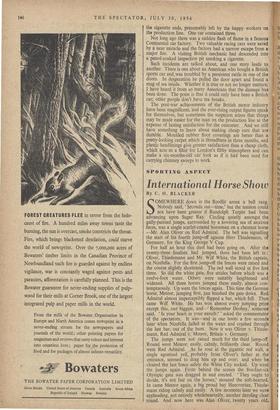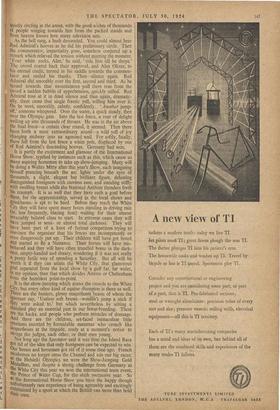SPORTING ASPECT
International Horse Show
By C. H. BLACKER SOMEWHERE down in the floodlit arena a bell rang. Nobody said, ' Seconds out—time,' but the tension could not have been greater if Randolph Turpin had been advancing upon Sugar Ray. Circling quietly amongst the gaily-painted jumps, surrounded by a towering sea of anxious faces, was a single scarlet-coated horseman on a chestnut horse —Mr. Alan Oliver on Red Admiral. The bell was signalling the start of his fourth jump-off against Herr Thiedemann, of Germany, for the King George V Cup.
For half an hour this duel had been going on. After the twenty-three finalists had jumped, three had been left in : Oliver, Thiedemann and Mr. Wilf White, the British captain, on Nizefella. For the first jump-off the fences were raised and the course slightly shortened. The red wall stood at five feet three. So did the white gate, five strides before which was a twelve-foot water. Others were suitably heightened and widened. All three horses jumped them easily, almost con- temptuously. Up went the fences again. This time the German horse, Meteor, jumping first, just brushed the gate down. Red Admiral almost imperceptibly flipped a bar, which fell. Then came Wilf White. He has won almost every jumping prize except this, our biggest, and—' Remember Drobny,' someone said. ' Is your heart in your mouth? ' asked the commentator of the spectators. It was—and in our boots a few seconds later when Nizefella failed at the water and crashed through the last bar, out of the hunt. Now it was Oliver v. Thiede- mann, Red Admiral v. Meteor, Britain v. Germany.
The jumps were not raised much for the third jump-off. Round went Meteor, easily, calmly, brilliantly clear. Round went Red Admiral. As he rose at the gigantic red wall, a single agonised yell, probably from Oliver's father at the entrance, seemed to drag him up and over; and when he cleared the last fence safely the White City rocked. Up Went the jumps again. From behind the scenes the five-feet-six Olympic gate was dragged in and erected. ' They ought to divide, it's not fair on the horses,' moaned the soft-hearted. In came Meteor again, a big proud bay Hanoverian, Thiede- mann riding calmly and easily. A few moments later we were applauding, not entirely wholeheartedly, another dazzling clear round. And now here was Alan Oliver, twenty years old, uiefYy circling in the arena, with the good wishes of thousands of people winging towards him from the packed stands and from heaven knows how many television sets.
As the bell rang, a hush descended. You could almost hear Red Admiral's hooves as he did his preliminary circle. Then the conunentator, impartiality gone, somehow conjured up a remark which relieved the tension without marring the moment. `Four white socks, Alan,' he said, ride him till he drops.' The crowd roared back their approval, and Alan Oliver, to his eternal credit, turned in his saddle towards the commen- tator and smiled his thanks. Then—silence again. Red Admiral slid smoothly over the first, second and third. As he turned towards that mountainous wall there rose from the crowd a sudden babble of apprehension, quickly stilled: Red Admiral rose at it in dead silence and then again, dramatic- ally. there came that single frantic yell, willing him over it. On he went, smoothly, calmly, confidently. ' Another jump- off,' someone whispered. Over the water, a quick steady, then over the Olympic gate. Into the last fence, a roar of delight welling up into thousands of throats. He was in the air above the final fence—a certain clear round, it seemed. Then there burst forth a most extraordinary sound—a wild yell of joy changing midway into an agonised wail. For softly, fatally, there fell from the last fence a white pole, displaced by one of Red Admiral's descending hooves. Germany had won.
It is partly the excitement and glamour of the International Horse Show, typified by instances such as this, which cause so many aspiring horsemen to take up show-jumping. Many will be doing a Walter Mitty after this year's Show, each imagining himself prancing beneath the arc lights under the eyes of thousands, a slight, elegant but brilliant figure, defeating distinguished foreigners with careless ease, and standing stiffly With swelling breast while the National Anthem thunders forth his triumph. It is as well that they have such a goal before them, for the apprenticeship, served in the local shows and gymkhanas, is apt to be hard. Before they reach the White City they will have spent many hours standing in driving rain (or, less frequently, blazing heat) waiting for their almost invariably belated class to start. In extreme cases they will have jumped in semi- or almost total darkness. They will have been part of a knot of furious competitors trying to convince the organiser that his fences are incompetently or even dangerously put up. Their children will have got bored and started to Be a Nuisance. Their horses will have mis- behaved and they will have often trundled home in the dark- ness, empty-handed and dreary, wondering if it was not really a pretty futile way of spending a Saturday. But all will be Worth it if they can attain the White City, that glamorous goal separated from the local show by a gulf far, far wider, In my opinion, than that which divides Aintree or Cheltenham from the humblest point-to-point. It is the show-jumping which draws the crowds to the White City, but every other kind of equine champion is there as well. 'There are the hunters, glossy magnificent beasts of whom the Ignorant say, Useless soft brutes—wouldn't jump a stick if tleY were asked to,' but which nevertheless by setting a S andard play an essential part in our horse-breeding. There are the hacks, and people who perform miracles of dressage. And there are the children, set-faced immaculate little creatures escorted by formidable mammas who crouch like leopardesses at the ringside, ready at a moment's notice to savage the judges, each other, or their own young. Not long ago the Spectator said it was time the Island Race got rid of the idea that only foreigners can be expected to win. Our horses and horsemen got rid of it some time ago. French racehorses no longer cross the Channel and win our big races; Medallists, the Helsinki Olympics we were the Show-Jumping Gold Medallists, and despite a strong challenge from Germany at the White City this year we won the international team event, the Prince of Wales Cup, for the sixth successive year. So at the International Horse Show you have the happy though unfortunately rare experience of being agreeably and excitingly entertained by a sport at which the British can more than hold their own.



































 Previous page
Previous page